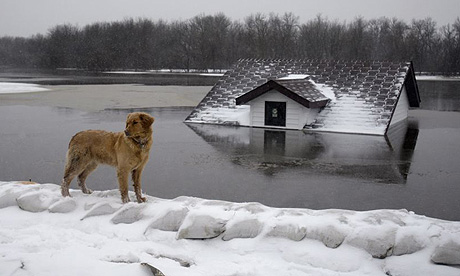
A decade ago, the writer Robin Silverman lost her home and almost all her possessions when North Dakota's Red River burst its banks, inundating whole towns. "It was a situation similar to when you receive a devastating diagnosis, or your spouse walks out on you," she recalled later. "Your knees buckle, your heart skips too many beats." She felt panic, then despair. And then, unexpectedly, a sense of peace. "My worst fear, that somehow everything that mattered could be taken from me, had come true," she writes. "It was the most liberating moment of my life."
Stories like this - of people hitting rock bottom, often harder than Silverman, and finding themselves somehow freed - are so abundant in self-help as to have become clichés. (An unwritten law of celebrity seems to compel every star who survives a life-threatening illness to call it "the best thing that ever happened to me".) Some of these tales smack of a desperate effort to "think positive". Others just seem smug: glib affronts to anyone who's faced a cancer diagnosis, or a traumatic bereavement, and found it pretty straightforwardly hellish, actually. Sometimes, though, there's something more profound going on. Either, as in Silverman's case, people realise they've spent their lives busily buffering themselves against a worst-case scenario that, it turns out, they can live with. Or - as with the hospice patients in Joan Halifax's eye-opening book on end-of-life care, Being With Dying - they receive the worst news, and finally stop struggling to avoid thinking about an event that was always inevitable. As one of them notes, we're all terminal cases.
Reading of such experiences prompts a kind of envy, which is rather awkward. Obviously, I don't want a terminal illness, or to lose everything. But I wouldn't mind some of that tranquillity. Must I go through a nightmare to get it?
There's one view of psychology that sees almost everything we do - in relationships, work, money, religious belief, the lot - as an effort to bolster a feeling of security, a sense of being shielded from the worst outcomes, whether that means poverty, loneliness, mediocrity, or death. As Bruce Schneier, an expert on airline and technological security, points out, we'll do irrational things to foster that feeling: we tell our children not to talk to strangers, for example, when in fact if a child's lost or in distress, "assuming a random person is a good guy is a smart security strategy".
There's a bigger issue, though, put most pungently by the great counterculture philosopher Alan Watts. What if it's precisely our security-seeking that causes our feelings of insecurity? If, as Watts argues, there's no true security - the river might flood, death is certain - then our efforts to protect ourselves are efforts to step out of "the flux of life", to separate ourselves from reality. But it's that very separation that makes us feel alone, vulnerable, and insecure: "In other words, the more security I get, the more I shall want ... the desire for security and the feeling of insecurity are the same thing." Try holding on to your breath, he suggests, by way of analogy: all it does is make you desperate to breathe. "A society based on the quest for security is nothing but a breath-retention contest," Watts writes, "in which everyone is as taut as a drum and as purple as a beet."

